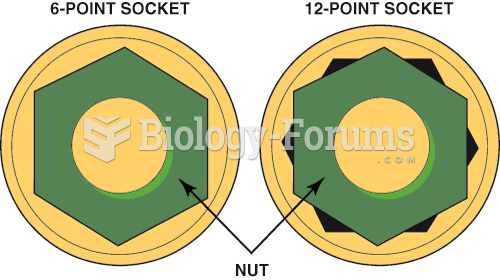|
|
|
Approximately one in four people diagnosed with diabetes will develop foot problems. Of these, about one-third will require lower extremity amputation.
Calcitonin is a naturally occurring hormone. In women who are at least 5 years beyond menopause, it slows bone loss and increases spinal bone density.
Women are 50% to 75% more likely than men to experience an adverse drug reaction.
The FDA recognizes 118 routes of administration.
Dogs have been used in studies to detect various cancers in human subjects. They have been trained to sniff breath samples from humans that were collected by having them breathe into special tubes. These people included 55 lung cancer patients, 31 breast cancer patients, and 83 cancer-free patients. The dogs detected 54 of the 55 lung cancer patients as having cancer, detected 28 of the 31 breast cancer patients, and gave only three false-positive results (detecting cancer in people who didn't have it).
 Vertebral compression Fractures of the spine (vertebra) can cause severe ”band-like” pain that radia
Vertebral compression Fractures of the spine (vertebra) can cause severe ”band-like” pain that radia
 A 6-point socket fits the head of a bolt or nut on all sides. A 12-point socket can round off the ...
A 6-point socket fits the head of a bolt or nut on all sides. A 12-point socket can round off the ...
 Lift sides of waist with deep effleurage strokes from the side. Move to opposite side and reach over ...
Lift sides of waist with deep effleurage strokes from the side. Move to opposite side and reach over ...




